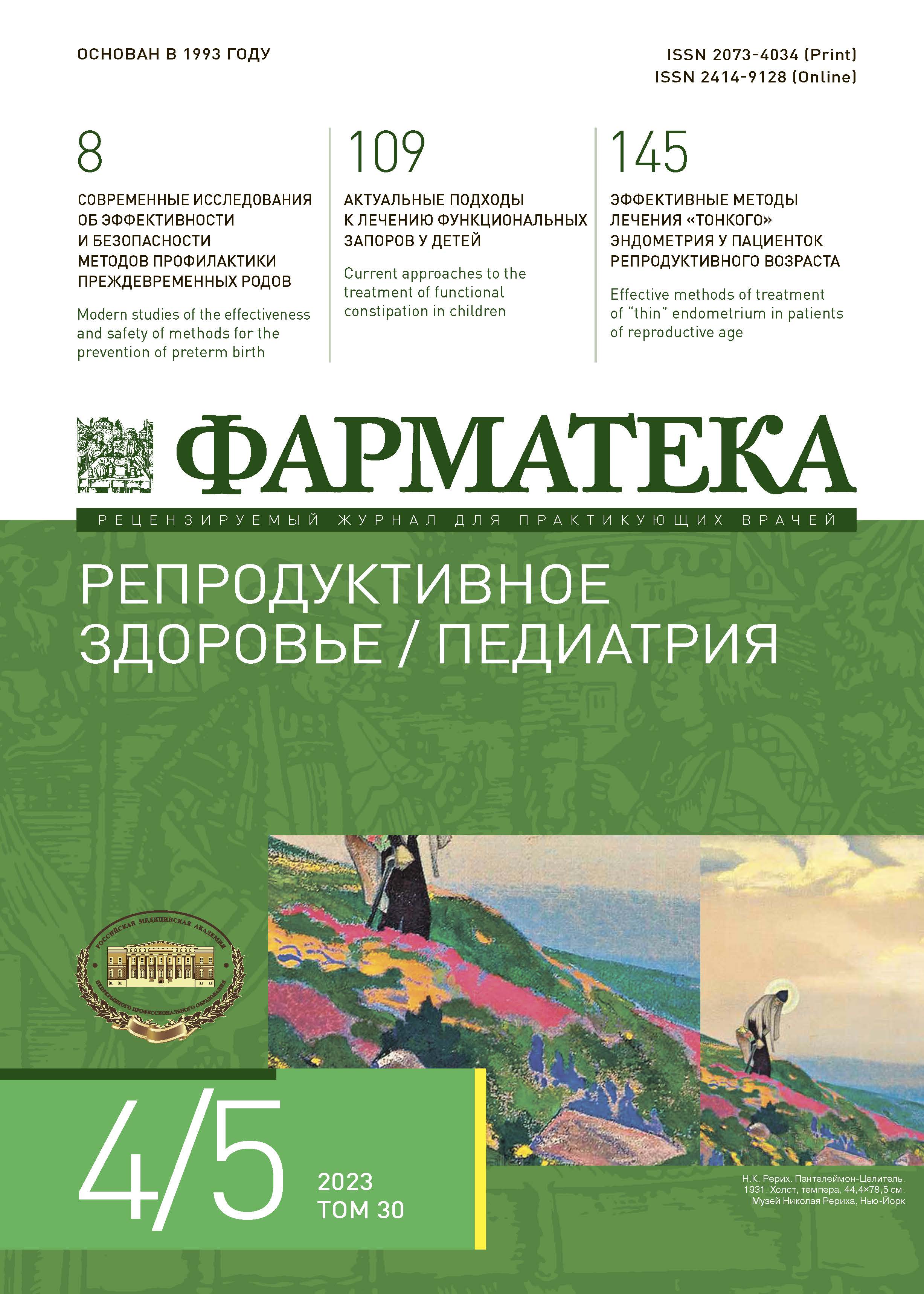Arterial hypertension in pregnant women: «comorbidity» or a risk factor for postoperative infectious complications?
- Авторлар: Korobkov N.A.1, Bakulina N.V.1, Maximov M.V.2
-
Мекемелер:
- North-Western State Medical University n.a. I.I. Mechnikov
- First St. Petersburg State Medical University n.a. Academician I.P. Pavlov
- Шығарылым: Том 30, № 4/5 (2023)
- Беттер: 90-95
- Бөлім: Original articles
- URL: https://journals.eco-vector.com/2073-4034/article/view/568046
- DOI: https://doi.org/10.18565/pharmateca.2023.4-5.90-95
- ID: 568046
Дәйексөз келтіру
Аннотация
Background. The risk of infectious complications after caesarean section in patients with arterial hypertension has not been studied enough.
Objective. to do research on the causal link between hypertensive disorders during pregnancy and the development of endometritis after caesarean section; to determine the prognostic value of arterial hypertension as an independent predictor of the development of postoperative infectious and inflammatory complications.
Methods. A retrospective study analysis of case histories and data from medical source records of 406 puerperas with endometritis after caesarean section and 242 puerperas with an uncomplicated postoperative period is completed.
Results. The frequency of hypertensive disorders during pregnancy is quite evident. The level of postpartum infectious morbidity wasn’t higher in puerperas with pregnancy-induced arterial hypertension (preeclampsia, gestational hypertension). As known, preeclampsia can develop faster in women having antenatal infection in past medical history, however, the inverse assumption about a higher number of postpartum infectious complication in preeclampsia has proved to be incorrect.
Conclusion. Chronic arterial hypertension complicates the course of pregnancy 10.8 times more frequently in puerperas with endometritis after caesarean section (8.6% vs. 0,8%; χ2=17,11; p<0,001). It makes possible to refer this hypertension to significant predictors of developing of infectious and inflammatory complications. It requires a more careful monitoring of the pregnant woman and the puerperal to prevent this type of complications. It can also serve as the basis for the subsequent construction of a prognostic risk model.
Толық мәтін
Авторлар туралы
Nikolay Korobkov
North-Western State Medical University n.a. I.I. Mechnikov
Хат алмасуға жауапты Автор.
Email: nikolai_korobkov@mail.ru
ORCID iD: 0000-0001-7279-2535
SPIN-код: 4191-3581
Cand. Sci. (Med.), Associate Professor at the Department of Obstetrics and Gynecology n.a. S.N. Davydov
Ресей, St. PetersburgN. Bakulina
North-Western State Medical University n.a. I.I. Mechnikov
Email: nikolai_korobkov@mail.ru
ORCID iD: 0000-0003-4075-4096
Ресей, St. Petersburg
M. Maximov
First St. Petersburg State Medical University n.a. Academician I.P. Pavlov
Email: nikolai_korobkov@mail.ru
ORCID iD: 0009-0000-0973-3073
Ресей, St. Petersburg
Әдебиет тізімі
- American College of Obstetricians and Gynecologists’ Committee on Practice Bulletins – Obstetrics. ACOG practice bulletin no. 203: chronic hypertension in pregnancy. Obstet Gynecol. 2019;133(1):e26–e50. doi: 10.1097/AOG.0000000000003020.
- Harrison R., Egede L., Palatnik A. Peripartum infectious morbidity in women with preeclampsia. J Matern Fetal Neonatal Med. 2021;34(8):1215–20. doi: 10.1080/14767058.2019.1628944.
- ACOG Committee on Practice Bulletins. Practice bulletin #202: Gestational hypertension and preeclampsia. Obstet Gynecol. 2019; 133:e1–25.
- Nourollahpour Shiadeh M., Riahi S., Adam I., et al. Helicobacter pylori infection and risk of preeclampsia: a systematic review and meta-analysis. J Matern Fetal Neonatal Med. 2017;32(2):1–8. doi: 10.1080/14767058.2017.1378331.
- Minassian C., Thomas S., Williams D., et al. Acute maternal infection and risk of pre-eclampsia: a population-based case-control study. PloS One. 2013;8:e73047. doi: 10.1371/journal.pone.0073047.
- Abalos E., Cuesta C., Carroli G., et al. WHO Multicountry Survey on Maternal and Newborn Health Research Network. Pre-eclampsia, eclampsia and adverse maternal and perinatal outcomes: a secondary analysis of the World Health Organization Multicountry Survey on Maternal and Newborn Health. BJOG. 2014;121:14–24. doi: 10.1111/1471-0528.12629.
- Smeeth L., Thomas S., Hall A., et al. Risk of myocardial infarction and stroke after acute infection or vaccination. N Engl J Med. 2004;351(25):2611–18. doi: 10.1056/NEJMoa041747.
- Gofton E., Capewell V., Natale R., et al. Obstetrical intervention rates and maternal and neonatal outcomes of women with gestational hypertension. Am J Obstet Gynecol. 2001;185(4):798–803. doi: 10.1067/mob.2001.117314.
- Adamyan L.V., Artymuk N.V., Belokrinitskaya T.E. Septic complications in obstetrics: clinical guidelines (treatment protocol). Ministry of Health of the Russian Federation. M., 2017. 63 p. (In Russ.). doi: 10.1111/j.1471-0528.2012.03452.x.
- Khodzhaeva Z.S., Shmakov R.G., Savelieva G.M. Preeclampsia. Eclampsia. [Edema, proteinuria and hypertensive disorders during pregnancy, childbirth and the postpartum period (treatment protocol): approved by the Russian Society of Obstetricians and Gynecologists. Ministry of Health of the Russian Federation. M., 2021. 81 p. (In Russ.).
- Pantham P., Aye I., Powell T. Inflammation in maternal obesity and gestational diabetes mellitus. Placenta. 2015;36(7):709–15. doi: 10.1016/j.placenta.2015.04.006.
- Jung E., Romero R., Yeo L., et al. The fetal inflammatory response syndrome: the origins of a concept, pathophysiology, diagnosis, and obstetrical implications. Semin Fetal Neonatal Med. 2020;25(4):101146. doi: 10.1016/j.siny.2020.101146.
Қосымша файлдар









